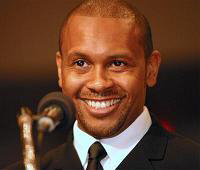FCNNEWSSOURCE
We need Black men to step up

Kevin Powell has journeyed from poverty; living in a fatherless household to become one of the most well sought after public speakers in the country. A well-known author, political and community activist, blogger and respected thought leader of the hip-hop generation, Powell recently penned his 11th book, “Barack Obama, Ronald Reagan, And The Ghost of Dr. King.” Final Call staff writer Starla Muhammad recently interviewed Mr. Powell on a range of topics including his role as an activist, Trayvon Martin, racial profiling of young Black men and the need for adult Black men to take charge in their communities. Below are excerpts from that interview.
Starla Muhammad (FCN): Thank you for taking time out to speak with The Final Call. My first question is, you’ve been a community activist for quite awhile and yet you are still a young brother. What keeps you motivated to keep doing what you do?

Kevin Powell (KP): I’m not young at all (laughs). I’m just committed to the people, that’s it. It’s real simple. My life is dedicated to the people, it’s been that case since I was a teenager, since I was 18 years old. Once you develop a level of consciousness, you have to act on it. You can’t just act like you’re not aware of what’s going on in this world.
It’s just many hardships that our people are facing all over this country and all over this globe and we need more and more people to be actively involved in community work and that’s what I do every single day of my life. If it’s not dealing with housing for people, it’s jobs, small business help; if it’s not that it’s helping folks staying out of jail or people who may be coming back in and dealing with prison reentry programs and it’s just what I do and I’m committed to it.
So whenever something happens like Trayvon Martin, which is something that I have been working on for years, issues of police brutality or racial profiling cases that’s critical that we have to deal with these things. So that’s all it is, my life is dedicated to the people. It’s real simple.
FCN: Now as someone who has been actively engaged in this national dialogue for years but of course now the focus is on the Trayvon Martin tragedy, is it surprising to you that even in 2012, for the most part, Whites and Blacks are viewing this whole dynamic through different lenses?
KP: Well you know, I don’t know. I saw these poll results, I’m not sure where they’re coming from. I will say this, I think that racism is alive and well in this country. Race privilege is alive and well in this country so I think that given how we’re socialized as Black people and White people in this country, it’s not surprising that there would be some different perceptions about it. But I also think because I’ve been doing this work for 28 years what seems to happen is that we’ll say well, Blacks are viewing things this way and Whites are viewing things that way. You begin to realize, especially because I was also a journalist for many years, that it’s a way for mainstream media to make it seem like we are at each other’s throat. Actually I have seen quite a few White folks be very supportive of this situation.
And I’ve had Black people actually say to me … ‘I’m tired of this. Why do we have to keep bringing it up?’ So it’s not necessarily just Black and White. I think the real issue is that do we understand that racism is alive and well in this country and that there’s a national problem with how Black people in this case (Black males) are treated in this country; and whether you’re Black or White or Latino or Asian, whatever your background, are you willing to speak out against skin privilege in this country and the notion that some people are deemed to be criminalistic or dangerous? That’s the issue to me. Are you willing to challenge racism?
And what I would say to White sisters and brothers out there is it’s not enough to just work and come around Black people and be around Black people and say well we support you; but what White sisters and brothers really need to do if they’re really sincere is extensive anti-racism work in their communities as well. Because they need to have those kind of conversations about race privilege, about skin privilege, about the educational system, about the mass media culture which is where George Zimmerman and the George Zimmermans of this country have gotten a notion that Black men, are nothing more than just suspicious.
Well we know that we are way more than that. But that’s where George Zimmerman got that mindset from. So I don’t care about the polls is what I’m saying. What I care about is what I see on a daily basis. I don’t need a poll to tell me what’s going on. I live in America, you know what I mean?
FCN: Some people have said that this (Trayvon Martin’s death and protests) is this generation’s Emmett Till moment; do you agree with that assessment?
KP: Well, it depends on what generation we’re talking about because it’s multiple generations out there. If we’re talking about Trayvon Martin’s generation, absolutely. We’re going to post something, sister, in a couple of days. It’s called ‘After Trayvon’ and the subtitle is ‘Black boys speak.’
Well, we did this about two days ago here in New York City. We felt that with nine Black boys between the ages of 10 and 17. I’ll tell you the thing that’s interesting to me is that we’ve been talking so many of us about these young brothers and how they are racially profiled and the things they go through but very few people have actually given them the space to speak. And what I’m telling you is compelling and these young men are brilliant, they’re geniuses, but we know all our children are geniuses. It is for them an Emmett Till moment and they actually brought up his name and they brought up some other names like Oscar Grant and Sean Bell as well.
I think it’s a wake-up call for their generation and I think it’s a wake-up call for, I’m in my 40s, our generation. I think it’s a wake-up call for Black people period. But I also think we have been selectively ignoring a lot of stuff that has been going on in this country.
You know New York City, just in 2011, the New York City police department itself said that about 683,000 people were stopped and frisked by the police. Eight-five to 90 percent were Black and Latino males so there’s a pattern going on around the country. What happened to Trayvon Martin is connected to voter suppression laws that are happening, Voter ID laws that are happening around the country. It’s connected to all the kind of attacks that comes from Republicans suggesting that Black people would rather be on welfare or collect food stamps than work which we know is an outright lie.
I’m saying as someone whose single mother raised them on food stamps and welfare while she was working, she didn’t want to be depending on anybody but we were poor. What we are seeing is a kind of vicious attempt to turn back the clock to the Reagan era and to the years before the Civil Rights Movement; we know what’s going on.
I think that it would be a mistake for us to see this as an isolated incident or just be angry about Trayvon Martin. We need to begin to think broadly as you all in the Nation of Islam and Minister Farrakhan has talked about for years and connect all of these dots.
FCN: Again thank you so much, Brother Kevin, for taking time out of your schedule. Are there any final thoughts or comments you would like to share with our readers?
KP: Well, what I would say especially to the Black males out there who are reading this is that, brothers, we have got to get re-engaged in the communities. When I was really a young man back in the 1980s, I was actually a member and very much a part of the Nation of Islam and part of the Nation of Gods and Earths and that’s where my consciousness came from. That’s where my activism came from and it was a lot of brothers that were involved in our communities around the country. What I’ve seen over the last 20 years, it’s been you all, sisters, that have been doing a lot of work on the front line and brothers have faded further and further to the back.
And so as this tragedy is going on with Trayvon Martin and all these other cases that are happening around the country and all the things that are being played out politically, we need Black men to step up. It is unacceptable for us to not be involved on a consistent basis in our community and there are good brothers out there and I know a lot of good brothers out there but we need more.
I can tell because I’ve been doing it for so long it’s not the same kind of urgency, the same kind of numbers that we once had. It can’t just be us reacting to tragedies like this. We’ve got to be engaging these young brothers in our communities. The violence is out of control. There’s gangs everywhere; I’m in New York there’s gangs; I’m in Mississippi there’s gangs, in Chicago there’s gangs; California there’s gangs.
The number one thing that I keep getting from a lot of these young brothers in the ‘hood wherever I go is ‘we don’t see no leaders; we don’t see no Black men.’ Many of them are like me; I grew up with no father, never really saw my father. I think part of the challenge is for us even as the protesting and organizing around and rightfully so, against racial profiling and police brutality, also let’s not forget this internal stuff that we have to do as a people; we got to get Black men to get back out there and really re-engage these boys and not be afraid of them.
We got to love them, we got to love them with compassion even if they’re challenging. It’s about their empowerment and not self-destruction.
FCN: Thank you.
You can follow Kevin Powell on Twitter at twitter.com/@kevin_powell.












